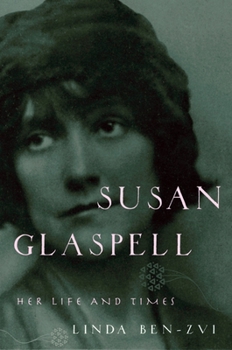Susan Glaspell: Her Life and Times
Select Format
Select Condition 
Book Overview
Trifles--a play exploring what happens when women unite against forces that deny them a voice and identity--has become an international classic, as powerful and relevant today as it was in the summer of 1916, when it was first staged by vacationing friends in a converted fishing wharf in Provincetown, Massachusetts. This biography is the story of its author, Susan Glaspell, and the forces that propelled her from her Midwest birthplace in Davenport, Iowa to Greenwich Village during its glory days, where she established herself as a central figure in the avant-garde community and became the first modern American woman playwright. Glaspell's life is a feminist tale of pioneering in which she broke new ground for women. A journalist by age eighteen, she worked her way through university as a news reporter and became a leading novelist of the period. A co-founder of many of Greenwich Village's important avant-garde institutions, she was a close friend of its leading figures, including Eugene O'Neill. She and O'Neill were equally credited with launching a new type of indigenous drama, hers addressing such pressing topics as suffrage, birth control, female sexuality, marriage equality, socialism, and pacifism. In 1931 she won the Pulitzer Prize for drama. "Out there--lies all that's not been touched--lies life that waits," Claire Archer says in The Verge, Glaspell's most experimental play. This biography is the exciting and inspiring story of Glaspell's personal exploration of the same terrain
Format:Paperback
Language:English
ISBN:0195313232
ISBN13:9780195313239
Release Date:July 2007
Publisher:Oxford University Press
Length:492 Pages
Weight:1.60 lbs.
Dimensions:1.0" x 6.1" x 9.2"
Customer Reviews
1 rating
Writing a Woman's Life
Published by Thriftbooks.com User , 20 years ago
Although little-known today, in her heyday (c. 1910-1940) Susan Glaspell was one of the most notable literary figures of her generation, a best-selling novelist, critically-acclaimed playwright, and a cultural leader of the modernist avant-garde, a legendary circle that shifted geographically from Chicago to New York to Paris, and included playwright Eugene O'Neill, novelists Theodore Dreiser and John Dos Passos, poets Djuna Barnes and Edna St. Vincent Millay, painter Georgia O'Keefe, labor journalists Jack Reed and Mary Heaton Vorse, anarchist activist Emma Goldman, and salon hostess Mabel Dodge Luhan. In Susan Glaspell: Her Life and Times, author Linda Ben-Zvi provides a thoroughly researched, richly detailed, and imminently readable analysis of Susan Glaspell's professional rise from "society girl" reporting in her native Iowa to Pulitzer-prize winning playwright of international fame, and an equally rich exploration of Glaspell's private life, including her marriage to the charismatic and iconoclastic George Cram ("Jig") Cook and her eight year liaison with writer Norman Matson, seventeen years Glaspell's junior. Ben-Zvi offers critical summaries of all of Glaspell's major works, including her nine novels, eleven plays, and her fascinating, genre-blurring auto/biography, The Road to the Temple. Born in Davenport, Iowa, in 1876, Susan Glaspell was, as Ben-Zvi writes, a "pioneer" and a "venturesome feminist" in art and life, one of the first generation of American women to embrace socialism, feminism, and self-realization as a woman and a citizen. Glaspell's fictional counterparts, in her novels, short stories, and plays were similarly strong women who "continually pushed against fixed boundaries." Ben-Zvi, who has published extensively on Glaspell, brings to her analysis a thorough knowledge of the social and aesthetic context within which Glaspell lived and worked. She brings the story of Susan Glaspell to life, and her remarkable account of one woman's remarkable life is highly recommended for anyone interested in Glaspell, women's biography, or American social and cultural history. Cheryl Black





